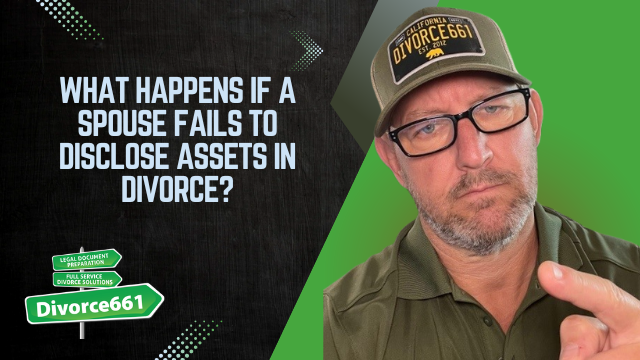What Happens If a Spouse Fails to Disclose Assets in Divorce?
Divorce can be a complicated and emotionally charged process, but one of the most serious legal violations that can occur during this time is failing to disclose assets. In California, both spouses are required by law to fully disclose all property, accounts, and income. Ignoring this obligation can lead to severe legal consequences that can drastically affect the outcome of a divorce. Understanding what constitutes full financial disclosure and the repercussions of asset concealment is crucial for anyone navigating this difficult terrain.
The Importance of Full Financial Disclosure
Full financial disclosure isn’t just a suggestion; it’s a legal requirement in California. Every asset must be declared, including:
- Bank accounts
- Real estate
- Retirement accounts
- Stocks and bonds
- Side incomes
This requirement ensures fairness and transparency in divorce proceedings. When one spouse attempts to hide assets, it can lead to significant legal repercussions, including the reopening of cases and even the awarding of the entire hidden asset to the other spouse. The stakes are high, and understanding the risks involved is essential.
Legal Consequences of Hiding Assets
Hiding assets during a divorce is considered fraud. This act can result in severe consequences, which may include:
- Reopening the divorce case
- Imposing penalties on the offending spouse
- Awarding the entire hidden asset to the other spouse
For instance, imagine discovering a $70,000 retirement account that your ex never disclosed. This scenario is not just hypothetical; it happened to one of our clients. We successfully used Family Code Section 2122 to reopen the case and correct the judgment, ensuring that justice was served.
Why Timely Action Matters
Timely action is vital in cases involving hidden assets. The law does allow for corrections, but strict time limits apply. Acting swiftly can mean the difference between recovering your rightful share and losing it forever. If you suspect your spouse has failed to disclose assets, don’t hesitate to seek legal advice. The sooner you act, the better your chances of a fair resolution.
How Divorce661 Can Help
At Divorce661, we specialize in reviewing disclosures and identifying red flags that may indicate hidden assets. Our services include:
- Reviewing financial disclosures to flag missing assets
- Helping you file motions to recover your share
- Providing flat-fee services for transparency
We understand the complexities of asset division and are committed to protecting your rights throughout the divorce process. Don’t wait; time is of the essence.
Real Client Story
One of our clients discovered after their divorce that their ex had hidden a $70,000 retirement account. This revelation was shocking and distressing. We filed a motion under Family Code Section 2122, successfully reopening the case to ensure the asset was divided fairly. This experience highlights the importance of vigilance and action when it comes to financial disclosures in divorce.
Understanding Financial Disclosure Under California Law
Full financial disclosure involves more than just listing assets; it requires a comprehensive understanding of what constitutes an asset. Under California law, both parties must provide a complete overview of their financial situation. This includes:
- Income statements
- Tax returns
- Debt disclosures
- Investment portfolios
Failure to disclose any of these can be seen as an attempt to mislead the court, which can have serious consequences.
The Impact of Non-Disclosure on Divorce Outcomes
Not only does hiding assets impact the immediate financial outcomes of a divorce, but it also damages trust and credibility in court. Courts tend to view transparency as key to a fair resolution, and any indication of dishonesty can lead to unfavorable judgments for the non-disclosing spouse.
Common Misconceptions About Asset Disclosure
Many people believe that minor omissions or misstatements won’t matter, but this couldn’t be further from the truth. Here are some common misconceptions:
- “It’s just a small amount.” Even small amounts can add up and signal a pattern of dishonesty.
- “I’ll just correct it later.” The opportunity to correct an omission may not always be available.
- “It won’t be found out.” Courts have tools and methods to uncover hidden assets.
What to Do If You Suspect Asset Concealment
If you suspect that your spouse is hiding assets, here are steps you can take:
- Gather evidence: Collect any documents or statements that suggest asset concealment.
- Consult a lawyer: Speak with an attorney experienced in divorce and asset division.
- File a motion: If necessary, file a motion to reopen the case or to compel full disclosure.
Taking these steps can help protect your financial future and ensure a fair outcome in your divorce.
Working with Financial Professionals
In complex cases, involving financial professionals can be beneficial. Consider working with:
- Forensic accountants to trace hidden assets
- Financial analysts to assess the value of undisclosed assets
- Tax professionals to understand the implications of asset division
These experts can provide valuable insights that can strengthen your case.
The Emotional Toll of Financial Deceit
Uncovering hidden assets can take an emotional toll. The feelings of betrayal and mistrust can complicate the already difficult divorce process. It’s essential to take care of your mental health during this time. Consider seeking support from counselors or support groups to navigate the emotional challenges that arise from financial deceit.
Final Thoughts
Understanding the implications of failing to disclose assets in a divorce is crucial for anyone navigating this complex process. Transparency is not just about legality; it’s about trust and fairness. If you suspect your spouse has hidden assets, don’t wait to act. Seek legal advice and take the necessary steps to protect your financial future.
At Divorce661, we are committed to helping you navigate these challenges. We offer a free consultation to discuss your situation and explore your options. Visit Divorce661.com today to take the first step toward safeguarding your financial future.

